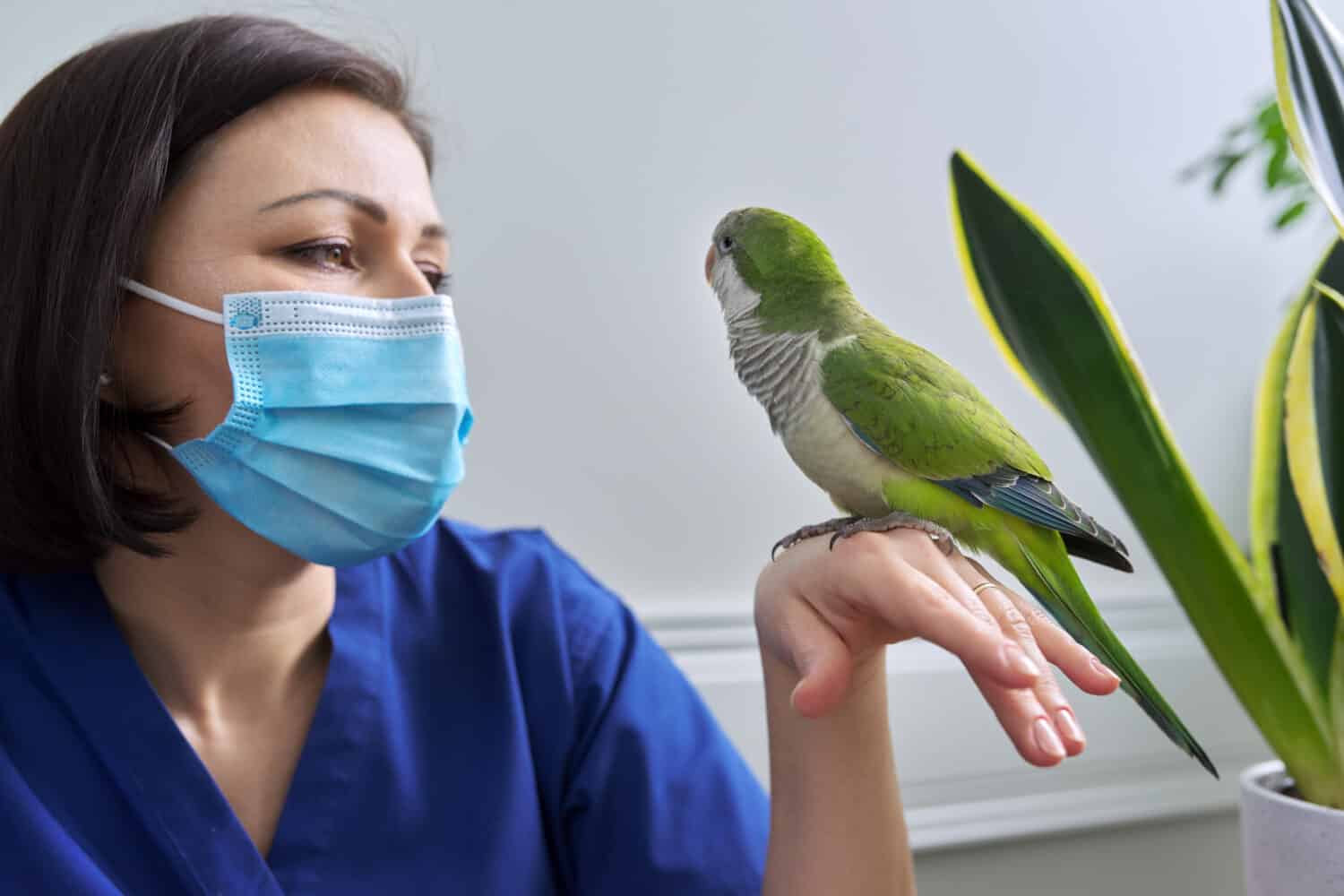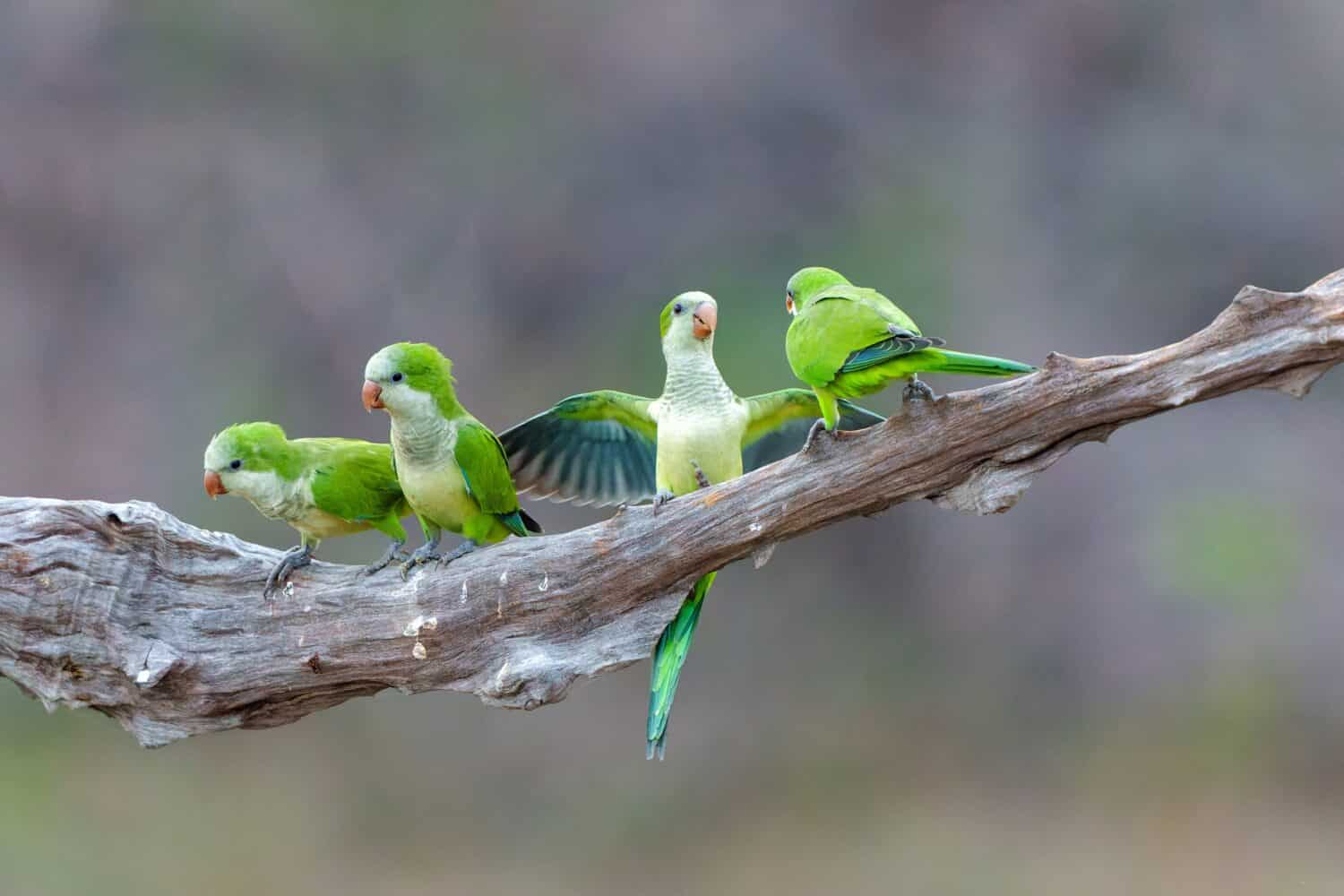The loveable Quaker parrot is technically a parakeet, which is a type of small to medium parrot. Commonly known as the monk parakeet (Myiopsitta monachus), this vibrant bird hails from South America. With the proper training, it makes a charming and loquacious pet. If you own or are planning to own a Quaker, you may be wondering about the average Quaker parrot’s lifespan. Read on to find out how long these birds live and how you can help maximize it.

Quaker Parrot Lifespan
Quaker parrots can live up to 20-30 years. The oldest confirmed individual lived to be 22 years old. However, there are unconfirmed reports of captive Quaker parrots exceeding 30 years of age. Like most birds, this species typically fares better in captivity than in the wild. Most feral Quaker parrots die within the first 15 years. This is due to factors like predation, harsh weather, disease, lack of food, and habitat loss.
As with any pet, it is crucial to consider how long you can invest in a Quaker parrot before bringing one home. These birds are highly social and form close bonds with their owners, making it difficult for them to adjust to a new home. In some cases, a transfer of ownership can have serious detrimental effects on a Quaker parrot’s mental and physical health. If you are not prepared to spend a quarter to a third of your life with the same pet, this is probably not the right species for you.
The Average Quaker Parrot Life Cycle

Quaker parrots form monogamous pairs.
©Christian Peters/Shutterstock.com
Quaker parrots form monogamous, lifelong pairs in the wild. Unlike the vast majority of parrot species, Quakers build stick nests in trees for their young. The female lays anywhere from four to 12 eggs in a single clutch, producing one to three clutches per year. Her eggs typically hatch after 21 to 28 days. Born blind and covered in yellow down, the hatchlings are dependent on their parents for survival.
Young parrots remain with their parents for the first 40-50 days, after which they leave the nest. They may or may not briefly return for about three months. Quaker parrots reach sexual maturity by two to three years of age and eventually pair off with another individual to begin their clutches. As prolific breeders, Quaker parrots have a high reproduction rate. However, most of a feral Quaker’s offspring either will not hatch or will not survive to adulthood.
Interestingly, Quaker parrots are so named because they “quake” as hatchlings when asking for food. Adults also quake when experiencing excitement or other strong emotions. Alternatively, some people believe this species’ name derives from its grey Quaker-like “bib” or green monk-like “hood.”
To encourage your pet Quaker parrot to bond with you, it is important to spend time with them, especially when they are young. Once formed, a bond is likely to last a lifetime. Two or more Quakers in the same home are likely to bond with each other as well as with their humans.
Factors Affecting Quaker Parrot Lifespan

Quaker parrots are susceptible to several diseases including fatty liver disease and psittacosis.
©VH-studio/Shutterstock.com
Several factors affect Quaker parrot lifespan. It is critical to take these into account when deciding whether to bring a Quaker home with you.
Captivity
As has already been mentioned, captive Quaker parrots are likely to live longer than their feral counterparts. Naturally, this depends on the quality of care the individual Quaker receives. Quaker parrots receiving high-quality care may well exceed their typical expected lifespan.
Disease
A sick parrot shows its discomfort in several ways. These ways may include a huddled stance, feather-plucking, atypical trembling, walking in circles, vocal or personality changes, atypical stool, squinting, flaky beak, ruffled or dull feathers, crusting or discoloration on legs, lameness, unusual breathing, appetite changes, or weight loss. Other symptoms may present. If you suspect your Quaker is unwell, seek immediate medical attention.
Here is a list of some common diseases affecting Quaker parrots:
- Fatty liver disease: This is often a result of a diet overly rich in fats. This can lead to obesity and an excess of fat in the liver.
- Psittacosis: Also known as “parrot fever,” this is a common infectious disease affecting all parrot species. The bacterium Chlamydophila psittaci causes a wide variety of symptoms including inflamed eyes, discharge from the eyes and nose, watery stool, loss of appetite, and depression.
- Giardia: This is a parasitic disease that causes diarrhea or bulky stool, weight loss, depression, and dry skin. Dirty water supplies are a common means of transmission between birds.
- Pacheco’s Disease: The herpes virus causes this disease, which is typically fatal. Your parrot may be asymptomatic for the first few weeks. However, symptoms may include nasal discharge, diarrhea, lack of appetite, green stool, and tremors. Death is usually sudden.
- Polyomavirus Infection: This deadly infection usually targets young captive birds and affects multiple organs at the same time. Symptoms include vomiting or regurgitation, swollen abdomen, loss of appetite, diarrhea and excessive urination, tremors, breathing problems, and depression.
Nutrition
Quaker parrots need a variety of foods to support their nutrition. Ensure your pet gets a good mix of high-quality pellets and bird seed as well as appropriate fruits, vegetables, and nuts.
Mental Health
Just like humans, Quaker parrots can suffer from poor mental health, which can affect their physical health. Common causes of mental health issues like depression and behavioral disorders include:
- Loneliness
- Inadequate living conditions (e.g., a cramped cage)
- Poor nutrition
- Illness
- Stress
How to Extend the Life of Your Pet Quaker Parrot

Quaker parrots are highly gregarious birds that need strong social bonds to be happy.
©Henk Bogaard/Shutterstock.com
There are several ways to extend the life of your pet parrot:
- Proper nutrition: Good food is the bedrock of a healthy animal. Make sure your Quaker is getting a high-quality mix as well as species-appropriate supplemental foods.
- Reduce stress: Like any animal, Quaker parrots are susceptible to stress. This can lead to any number of health issues and behavioral problems. Look out for unusual behavior, changes in eating patterns, or atypical defecation.
- Spend time with them: Quaker parrots are extremely social birds that crave companionship, whether from other birds, humans, or even non-avian animals. Their mental and emotional health impacts their physical health and behavior. A lonely or unhappy Quaker parrot may act out in various ways, including indulging in damaging behaviors like feather-plucking. Some Quakers are content with human companionship while others may benefit from the presence of another member of their species. Remember that, in the wild, they live in large groups and are therefore naturally gregarious.
Conclusion
Quaker parrots live a long time and need a lot of companionship and care from their humans. If you come prepared for a decades-long investment, you place yourself in an excellent position to reap the generous rewards of the loveable and talkative Quaker.
The photo featured at the top of this post is © Foto 4440/Shutterstock.com
Thank you for reading! Have some feedback for us? Contact the AZ Animals editorial team.







